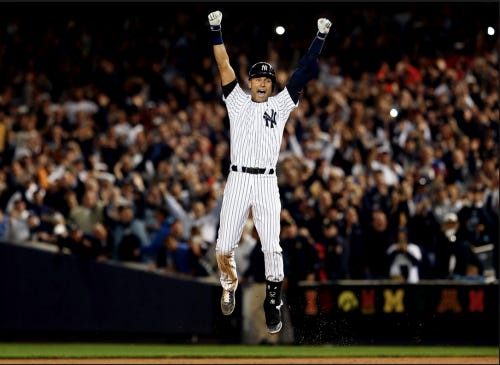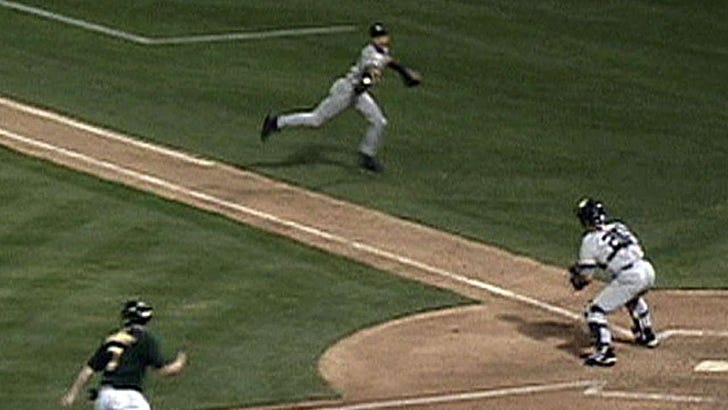I saw Derek Jeter play
As a kid, my Dad saw DiMaggio in his prime. For my brother's generation, the player was Mantle. And, while Bobby Murcer was my favorite player, the Yankees of my teen years didn't have a DiMaggio or Mantle. Don Mattingly came along in the 1980's and showed glimpses of that type of greatness. Then, on June 1, 1992, the Yankees used the sixth overall pick in the MLB Amateur Draft to select Derek Jeter. The boy who wanted to play shortstop for the New York Yankees was drafted out of high school in Kalamazoo, MI. And, I eventually had a player that I could tell generations to come that I saw play.
The draft was not widely publicized or broadcast as it is today. Nor was there coverage of minor league baseball readily available on the web, which was still in its infancy, or on a television. Baseball Weekly, introduced in print in 1991, provided a modicum of minor league coverage but it was mainly just statistics. What little there was told of a shortstop who hit .210 at two levels post-high school. He also committed 21 errors in just 57 games in his first professional season. But, the man responsible for signing him, scout Dick Groch, saw something in Jeter. Houston Astros' scout and former two-time AL MVP, Hal Newhouser saw it too. He told the Astros to take Jeter with the number one overall pick. When the Astros selected Wichita State's Phil Nevin instead, Newhouser quit his job.
Groch was standing next to a coach from Michigan State University, who remarked that he had to get this kid. "I told him to save his postage," Groch said. "This kid was not going to college. I've seen a lot of kids, and watching Derek was like the difference between going to the Kentucky Derby and going to a race at the county fair."
Jeter made 56 errors in 1993 but started to show the form at the plate that would make him a perennial All-Star and a sure-shot Hall of Fame member. Jeter inside-outed and pulled 30 baseballs that went for extra-base hits en route to a .295 average. A year later, his baserunning skills and speed led to 50 stolen bases. He also hit .344 and was named Minor League Player of the Year by a number of publications. It was only a matter of time before Jeter made his Major League debut, and he got the call up for the last month of the 1995 season. A year later the plan was put into place - Jeter would be the everyday shortstop while veteran shortstop Tony Fernandez would slide over to second base. But after Fernandez broke his wrist, it almost didn't happen.
The Yankees front office, George Steinbrenner included, started to doubt whether Jeter was ready to carry the everyday load of playing one of the most important positions in baseball. They contemplated trading Mariano Rivera, who excelled during the 1995 playoffs, as part of a package to obtain shortstop Felix Fermin from Seattle. Defensively, Fermin was as solid as they came, but he couldn't hit a lick. Thankfully, Gene Michael and other voices prevailed. The Yankees stuck with their original plan for Jeter and kept Rivera as a major asset in the bullpen. Jeter's rookie season was impressive. Sure, there were the mistakes that young players make...getting thrown out trying to steal third base with two outs and a good hitter at the plate, to name just one. When those mental errors did occur, manager Joe Torre would have Jeter sit down beside him in the dugout to explain what he did wrong. Sometimes bench coach Don Zimmer, who became Jeter's de facto good luck charm, would school the 22-year old. Named the AL Rookie of the Year (ROY), Jeter helped lead the Yankees to their first World Series title since 1978. In doing so, he became the first ROY to win a championship in the same year since future teammate Chuck Knoblauch, who accomplished the feat with the 1991 Minnesota Twins. Jeter also became the first shortstop to win ROY and the World Series in the same season. The Yankees fans had in Jeter their first young player since Mattingly to hitch their wagon to. In his 14 seasons in the Bronx, Mattingly had arguably become the most the popular athlete in New York. He was certainly the most popular Yankee of his generation. Considered one of the top five players in Major League Baseball from 1984-1989, Mattingly's back derailed his possible ascension to the Hall of Fame. It was only natural that Jeter (in 2003) would be the first team captain since Mattingly, who retired after the 1995 season. Jeter was fortunate. His body held up to the wear and tear of playing (on average) 154 games per year for the first seven full seasons of his career. And, after he played in just 119 games in 2003 due to a shoulder injury he suffered early in the year, he was back to 153 games a year for the seven seasons that followed. Most importantly, as his career grew and three more World Series titles followed in the following four seasons, Jeter showed that he was mentally tough. He endured slumps and didn't take a bad at-bat out into the field with him. If he committed an error, it was already forgotten by the time the next batter came up. The media and some fans criticized Jeter over the years for his unemotional, by-the-book responses to reporters' questions, but it was that same even-tempered demeanor that helped to keep him consistent on the field. The Yankees were winning championships early in Jeter's career, but his play took a backseat to fellow shortstops Nomar Garciaparra and Alex Rodriguez. He wasn't named to the All-Star team in either of his first two seasons. That all changed from 1998 through 2001 when Jeter was named an All-Star and finished in the top-10 in the AL MVP vote. He had also been shifted from the bottom of the batting order to the leadoff spot. Over the next several years he would hit either first or second in the order, setting the table for RBI- men like Bernie Williams, Tino Martinez, and Paul O'Neill (Jeter scored more than 100 runs 13 times in his career). Defensively, he showed tremendous range and developed a jump-throw to first base for balls hit deep in the hole between himself and third base. He could run full-out, back to the infield, to catch a pop-up over his shoulder. The "flip play" demonstrated his uncanny ability to be in the right place at the right time. Off the field, Jeter was just as steady. While he lived the bachelor lifestyle to the fullest - dating singers, supermodels, pageant contestants and more, he rarely showed up in the gossip columns in the city's newspapers. He was extremely private and it worked to his advantage. Only once in his career did Steinbrenner call him out for partying and it was a silly accusation that was quickly forgotten about (but, not before the duo appeared in a credit card commercial that spoofed the incident). After Jeter started to receive major money from the Yankees and his MVP-caliber seasons, Gold Glove and Silver Slugger Awards piled up, a funny thing happened. An anti-Jeter sentiment began to grow among players from other teams, SABRmetricians, and fans of other teams. Among the things we read and heard were:
"He's overrated."
"He's overpaid."
"He's a defensive liability."
"He plays the game right", was said with a sarcastic tone. The same tone was taken when talking about the intangibles he brought to the game.
"The Yankees would have won the World Series with anyone at shortstop."
"Jeter would be considered ordinary on any other team."
On and on it went. Some of the surveys and remarks from fellow players were undoubtedly the by-product of jealousy. Other opinions were formed by people who didn't get the chance to see Jeter play on a daily basis. Similarly, New York Rangers fans knew what a great player Mark Messier was, but until he was traded from Edmonton to the New York, they had no idea just how great he was. Like every other athlete, injuries mounted as Jeter got older and he didn't heal as quickly as he once did. But, they were injuries that rarely kept him out of the lineup. And, the severity of those injuries was never known. So, it was only natural for him to lose defensive range. But, he still went hard after every baseball. Late in his career, Jeter's legs began to betray him, but he still busted it out of the batter's box every time. And, while some people got annoyed when announcers like Michael Kay pointed it out, lesser players with much more to prove, didn't show the same hustle. So, why not point out that a player closer to the end of his career than the beginning still played as hard as when he was 25? He also showed the kids watching how the game should be played. His salary? Worth every penny. It didn't matter if he made more money than a guy hitting 40 home runs every year. He brought much more to the game, day in and day out. There's a reason that Bud Selig and others in MLB considered him the face of the game. It's difficult to find too many people that were better ambassadors for the game.

Jeter's last few seasons weren't pretty. There was the devastating ankle injury in the 2012 playoffs that morphed into a quad injury and kept him out of all but 17 games in 2013. His final season at the plate was forgettable. He had the worst OPS of his career but out of loyalty and despite criticism, Joe Girardi continued to bat him at the top of the lineup. And, to all those who complained about it, I say, "So, what?" People forget that before the postseason ankle injury in 2012, he had put together an MVP-type season. His 216 hits, 683 at-bats, and 740 plate appearances were all tops in the AL. He hit .316, scored 99 runs and knocked 15 home runs out of the park. At 39-years of age, he finished seventh in the AL MVP voting. Kay probably summed it up best at the conclusion of Jeter's last home game in 2014. The greatest shortstop in Yankees history had just driven in the game winner with his inside-out swing and a single to the right side. Kay's call: "Derek Jeter, where fantasy becomes reality." Over 3,000 hits, five World Series rings, "Mr. November", "the flip", "the dive (into the stands)", the 2000 WS relay, the jump throw, the intangibles, no one prouder to be a Yankee, etc. Yeah, kid. I saw Derek Jeter play.


